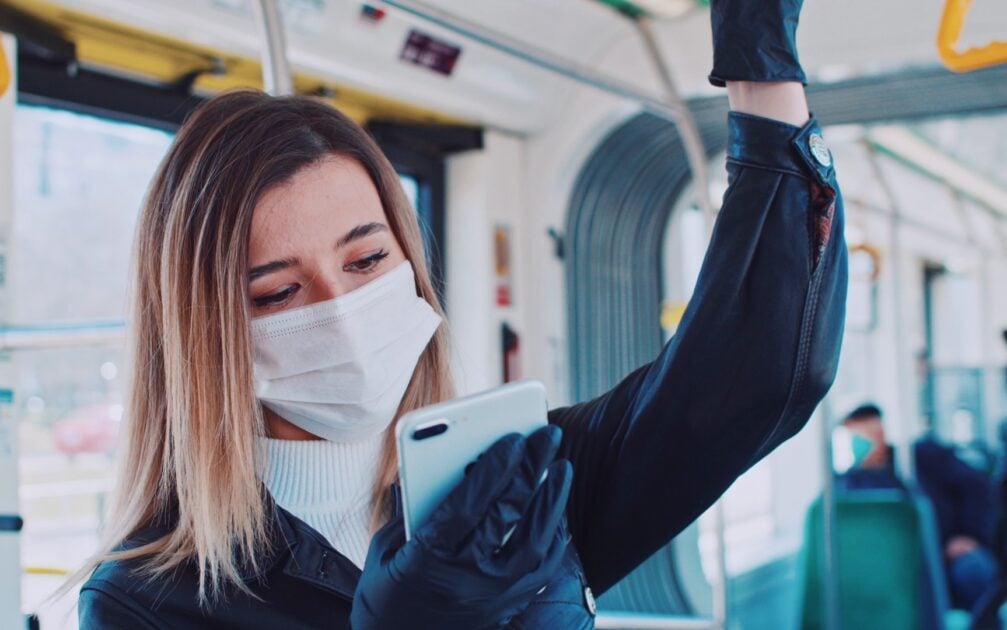How I feel about the COVID restrictions easing
SpunOut.ie contributor Elle talks about dealing with uncertainty and what the new normal will be

I recently took the bus four-point-seven kilometres across Dublin to pick up the keys for my new apartment. It was the first time I’d taken a bus in several months, and things looked different. Almost every seat had one of those yellow COVID-19 banners saying you couldn’t sit there, and the constant reminders about COVID-19 on the radio made me feel like I was in an apocalypse movie. Another marker of this brave new world: I’d only viewed this apartment virtually.
Is this the new normal?
Even though lockdown is easing and we’re allowed out again, things don’t feel normal. I get a sense of distrust around people when I leave the house to shop, where no one wants to get too near each other. I’ve had an itchy nose—yes, that most terrible of maladies—for six months, and I have a slight fear that if I sneeze I’ll be seen as a Plague Carrier and attacked. I’m one of the lucky ones who’s been able to stay home in a safe environment and hasn’t had anyone get sick.
Moving house reminds me that life moves on—we can’t hunker down in place forever. For me, at least, it’s easy to just freeze and endure for the duration of an emergency, even a long one. It’s harder to have to say, OK, this is here to stay, let’s adapt to the changed situation. It’s accepting that this isn’t just a flash in the pan.
Dealing with uncertainty
And it isn’t. We don’t know how the rest of the pandemic is going to pan out, whether our control measures will work, whether there’ll be a second wave much worse than the first like in the 1918 flu pandemic, or whether it’ll become an annual infection that circulates in our population. Even if the control we’ve managed to achieve over the virus in Ireland is maintained, we don’t know what’ll happen to international relations and the world at large. Many groups are working on vaccines, but we have no guarantee of how well they’ll work. Public health tools are still the best things we have, as lots of places still don’t have robust testing infrastructure.
We have to make a lot of decisions under conditions of uncertainty. We don’t know how long it will take until things return to a semblance of normal, we don’t know how bad it’ll get, and we don’t know what normal will look like. I certainly don’t envy decision-makers right now, especially the ones who had to cancel big events months in advance back in March while everything was so fluid. Lockdown temporarily took away the need to make decisions, but that’s ending now.
Thinking back to the start of the pandemic
People have described this as a huge collective trauma, and it’s hard to know how you heal when there’s no closure. When do things start feeling normal again? We’re moving on from a moving target. March, again and again, required us to adjust our expectations. It’s arrived in Europe! It spreads person-to-person! Tens of thousands infected in Italy! Make sure to social distance while out and about—no, wait, don’t go out at all, you’re under lockdown. The World Health Organisation (WHO) say not to bother wearing a mask, then change their mind. The US suddenly suspended travel from Europe (unbelievably, that was only March 12, the same day college closed, and only two days after the Halsey concert in the 3 Arena I’d decided to skip last-minute). I was reading about ‘the novel coronavirus’ online back in January and remember it happening—at least from an Irish perspective—very slowly, then all at once. Which, of course, is how exponential processes work, but even knowing that mathematically it’s hard to predict how it feels. Exponential growth in infections also means that slight changes in quarantine measures can have huge effects.
Mixed feelings at this stage
All this means I have mixed feelings about the end of lockdown. I’m thrilled that we’ve managed to get it mostly under control in Ireland so far and that we’ll be able to see each other again. But I do think in some ways this will be harder. During lockdown, we just had to freeze and wait for things to happen—now it’s up to us. In the depths of lockdown, I could pretend that we’d temporarily been shuttled to an alternate dimension and ‘normal life’ was waiting, preserved in amber for us to come back to once we sheltered the storm. But as the country opens back up, life will be filled with masks and gloves and seating restrictions, and that illusion will be gone.






